综合教程第二册Unit 2 The Virtues of Growing Older
- 格式:doc
- 大小:78.50 KB
- 文档页数:9
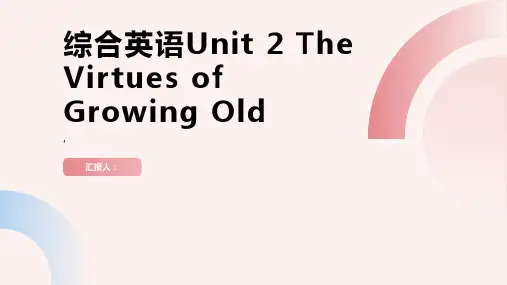
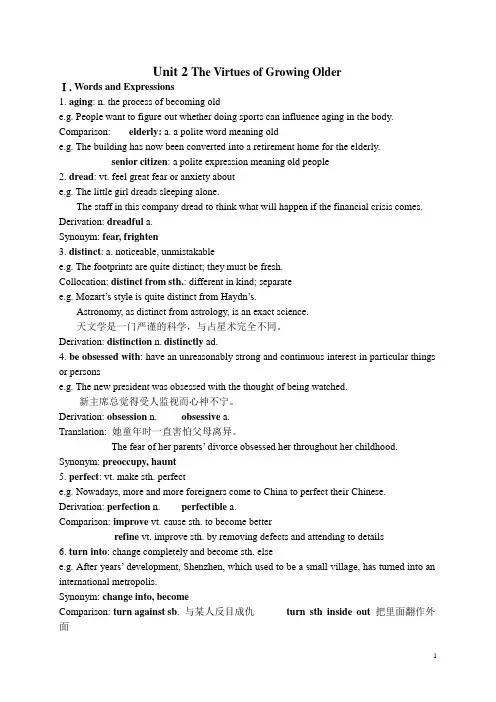
Unit 2 The Virtues of Growing OlderⅠ.Words and Expressions1. aging:n. the process of becoming olde.g. People want to figure out whether doing sports can influence aging in the body. Comparison: elderly: a. a polite word meaning olde.g. The building has now been converted into a retirement home for the elderly.senior citizen: a polite expression meaning old people2. dread: vt. feel great fear or anxiety aboute.g. The little girl dreads sleeping alone.The staff in this company dread to think what will happen if the financial crisis comes. Derivation: dreadful a.Synonym: fear, frighten3. distinct: a. noticeable, unmistakablee.g. The footprints are quite distinct; they must be fresh.Collocation: distinct from sth.: different in kind; separatee.g. Mozart’s style is quite distinct from Haydn’s.Astronomy, as distinct from astrology, is an exact science.天文学是一门严谨的科学,与占星术完全不同。
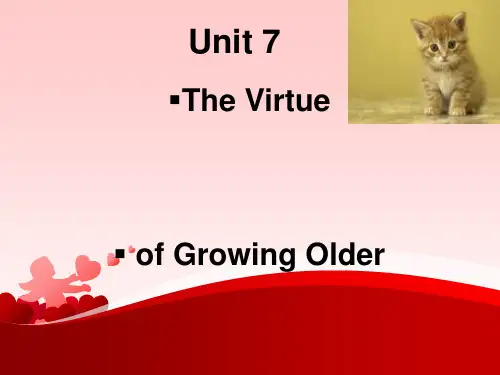
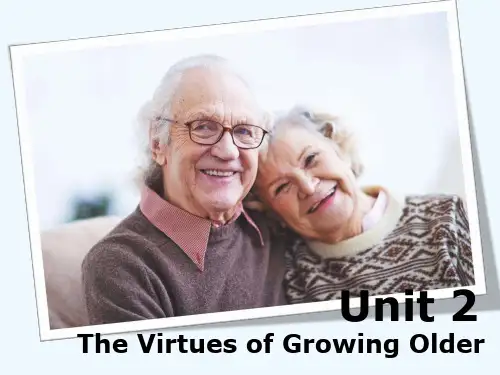

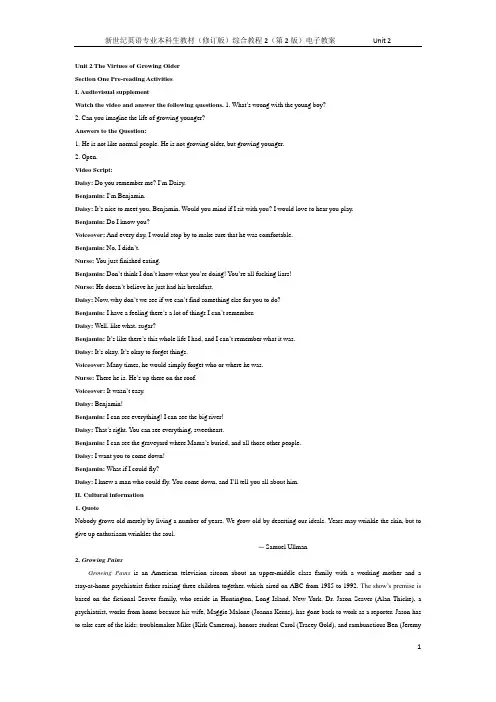
Unit 2 The Virtues of Growing OlderSection One Pre-reading ActivitiesI. Audiovisual supplementWatch the video and answer the following questions. 1. What’s wrong with the young boy?2. Can you imagine the life of growing younger?Answers to the Question:1. He is not like normal people. He is not growing older, but growing younger.2. Open.Video Script:Daisy: Do you remember me? I’m Daisy.Benjamin: I’m Benjamin.Daisy: It’s nice to meet you, Benjamin. Would you mind if I sit with you? I would love to hear you play.Benjamin: Do I know you?Voiceover: And every day, I would stop by to make sure that he was comfortable.Benjamin: No, I didn’t.Nurse: You just finished eating.Benjamin: Don’t think I don’t know what you’re doing! You’re all fucking liars!Nurse: He doesn’t believe he just had his breakfast.Daisy: Now, why don’t we see if we can’t find something else for you to do?Benjamin: I have a feeling there’s a lot of things I can’t remember.Daisy: Well, like what, sugar?Benjamin: It’s like there’s this whole life I had, and I can’t remember what it was.Daisy: It’s okay. It’s okay to forget things.Voiceover: Many times, he would simply forget who or where he was.Nurse: There he is. He’s up there on the roof.Voiceover: It wasn’t easy.Daisy: Benjamin!Benjamin: I can see everything! I can see the big river!Daisy: That’s right. You can see everything, sweetheart.Benjamin: I can see the graveyard where Mama’s buried, and all those other people.Daisy: I want you to come down!Benjamin: What if I could fly?Daisy: I knew a man who could fly. You come down, and I’ll tell you all about him.II. Cultural information1. QuoteNobody grows old merely by living a number of years. We grow old by deserting our ideals. Years may wrinkle the skin, but to give up enthusiasm wrinkles the soul.—Samuel Ullman2. Growing PainsGrowing Pains is an American television sitcom about an upper-middle class family with a working mother and a stay-at-home psychiatrist father raising three children together, which aired on ABC from 1985 to 1992. The show’s premise is based on the fictional Seaver family, who reside in Huntington, Long Island, New York. Dr. Jason Seaver (Alan Thicke), a psychiatrist, works from home because his wife, Maggie Malone (Joanna Kerns), has gone back to work as a reporter. Jason has to take care of the kids: troublemaker Mike (Kirk Cameron), honors student Carol (Tracey Gold), and rambunctious Ben (JeremyMiller). A fourth child, Chrissy Seaver, was born in 1988.Section Two Global ReadingI. Main ideaThis piece of writing is an attempt to subvert the “traditional” view and convince the reader that growing older is not necessarily that dreadful. The author points out a number of advantagesof growing older. These advantages are enumerated on the basis of the experiences of her brother and her own. By means of contrast (being young and being old) the author reveals true happiness and contentment in old age, which have often been overlooked.II. Structural analysis1. Divide the text into parts by completing the table.2. What techniques does the author adopt to present the advantages of growing older?The author illustrates them with examples and by contrast (being young and being old).Section Three Detailed ReadingText IThe Virtues of Growing OlderCarol Siskin1Our society worships youth. Advertisements convince us to buy Grecian Formula and Oil of Olay so we can hide the gray in our hair.1 Middle-aged folks work out in gyms and jog down the street, trying to delay the effects of aging.2Wouldn’t any person over thirty gladly sign with the devil just to be young again?2 Is n’t aging an experience to be dreaded? Perhaps it is un-American to say so, but I believe the answer is “No.” Being young is often pleasant, but being older has distinct advantages.3When young, you are apt to be obsessed with your appearance.3When my brother Dave and I were teens, we worked feverishly to perfect the bodies we had. Dave lifted weights, took megadoses of vitamins4, and drank a half-dozen milk shakes a day in order to turn his wiry adolescent frame into some muscular ideal. And as a teenager, I dieted constantly. No matter what I weighed, though, I was never satisfied with the way I looked. My legs were too heavy, my shoulders too broad, my waist too big. When Dave and I were young, we begged and pleaded for the “right” clothes. If our par ents didn’t get them for us, we felt our world would fall apart.5 How could we go to school wearing loose-fitting blazers when everyone else would be wearing smartly tailored leather jackets? We would be considered freaks. I often wonder how my parents, and parents in general, manage to tolerate their children during the adolescent years. Now, however, Dave and I are beyond such adolescent agonies. My rounded figure seems fine, and I don’t deny myself a slice of pecan pie if I feel in the mood. Dave still works out, but he has actually become fond of his tall, lanky frame. The two of us enjoy wearing fashionable clothes, but we are no longer slaves to style6. And women, I’m embarrassed to admit, even more than men, have always seemed to be at the mercy of fashion7. Now my clothes are attractive yet easy to wear. We no longer feel anxious about what others will think. As long as we feel good about how we look, we are happy.4Being older is preferable to being younger in another way. Obviously, I still have important choices to make about my life, but I have already made many of the critical decisions that confront those just starting out.8 I chose the man I wanted to marry. I decided to have children. I elected to return to college to complete my education. But when you are young, major decisions await you at every turn. “What college should I attend? What career should I pursue? Should I havechildren?” These are just a few of the issues facing young people. It’s no wonder that, despite their carefree façade, they are often confused, uncertain, and troubled by all the unknowns in their future.5But the greatest benefit of being forty is knowing who I am. The most unsettling aspect of youth is the uncertainty you feel about your values, goals, and dreams. Being young means wondering what is worth working for. Being young means feeling happy with yourself one day and wishing you were never born the next. It means trying on new selves by taking up with different crowds.9 It means resenting your parents and their way of life one minute and then feeling you will never be as good or as accomplished as they are. By way of contrast, forty is sanity. I have a surer self-identity now. I don’t laugh at jokes I don’t think funny. I can make a speech in front of a town meeting or complain in a store because I am no longer terrified that people will laugh at me; I am no longer anxious that everyone must like me. I no longer blame my parents for my every personality quirk or keep a running score of everything they did wrong raising me. Life has taught me that I, not they, am responsible for who I am. We are all human beings — neither saints nor devils.6Most Americans blindly accept the idea that newer is automatically better. But a human life contradicts this premise.There is a great deal of happiness to be found as we grow older. My own parents, now in their sixties, recently told me that they are happier now than they have ever been. They would not want to be my age. Did this surprise me? At first, yes.Then it gladdened me. Their contentment holds out great promise for me as I move into the next — perhaps even better—phase of my life.10Paragraphs 1-2Questions1. Why do people want to hide their gray hair and delay the effects of aging? (Para. 1)They worship youth and are afraid of growing older, so they try every means to look young.2. What does the writer mean when she says “it is un-American to say so” in Para. 2?(Para. 2)She means these questions seem contrary to the values commonly held by most Americans. And the American people would do anything possible to delay aging.3. Does the writer deny the virtues of being young? (Para. 2)No, she does not. The writer admits the virtues of being young, but what she really wants to talk about is the advantages of growing older, which will be discussed in the subsequent paragraphs. So the last sentence is both thematic and transitional. Words and Expressions1. aging n. the process of becoming olde.g. People want to figure out whether doing sports can influence aging in the body.Comparison:elderly a. a polite word meaning olde.g. The building has now been converted into a retirement home for the elderly.senior citizen a polite expression meaning old people2. dread vt. feel great fear or anxiety aboute.g. The little girl dreads sleeping alone.The staff in this company dread to think what will happen if the financial crisis comes.Derivation:dreadful a.Synonym:fear, frighten3. distinct a. noticeable, unmistakablee.g. The footprints are quite distinct; they must be fresh.Collocation:distinct from sth. different in kind; separatee.g.Mozart’s style is quite distinct from Haydn’s.Astronomy, as distinct from astrology, is an exact science.天文学是一门严谨的科学,与占星术完全不同。
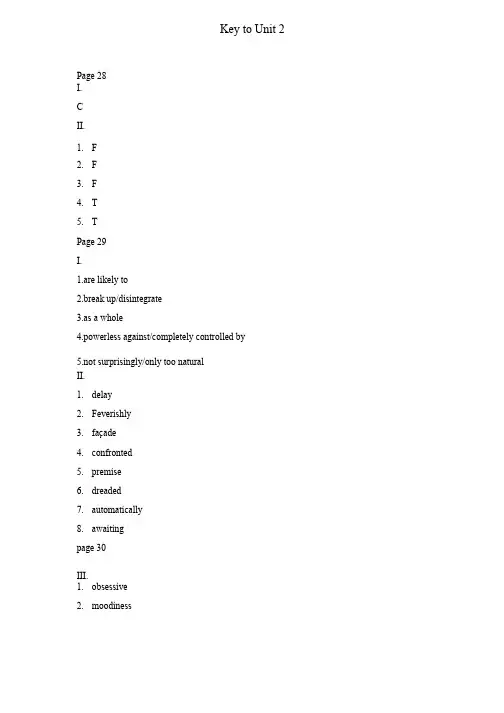
Key to Unit 2Page 28I.CII.1. F2. F3. F4. T5. TPage 29I.1.are likely to2.break up/disintegrate3.as a whole4.powerless against/completely controlled by5.not surprisingly/only too naturalII.1. delay2. Feverishlyadefaçade3. faç4. confronted5. premise6. dreaded7. automatically8. awaitingpage 30III.1. obsessive2. moodiness4. beneficial5. satisfying6. hidden7. preference8. criticismsIV.1. C2. D3. A4. A5. B6. D7. C8. BPage 31V.1.conceal, disguise2.narrow3.satisfaction, happiness, joy4.merits, advantages5.fat, plump6.well-built7.old-fashioned, outdated8.clearly,evidentlyVI.1. prepare2. progress3. foresee4. parallel5. perimeter7. semiconductor8. deceleratePage 32I.1. agony2. agonies3. experience4. experiences5. youth6. a youth7. a great help8. a good knowledge9. a gray hair10. workII.1. A2. B3. D4. C5. A6. B7. B8. CIII.a lot of, a little, some, a few, A, some, some, a lot of, X, many, X, a lot ofIV.1.all, Every One, Every2.each3.Every4.each5.Everyone6.Each7.everyone, everyone8.EachPage 34V .1.you must take care2.Though he received the document late at night, it3.When he fell4.When you read5.I became clear about what he meant6.We saw the first star shining in the sky7.who were eating8.he was cleaningPage 35I.1. 许多中年人去健身房锻炼,到街上跑步,为的是延缓衰老。
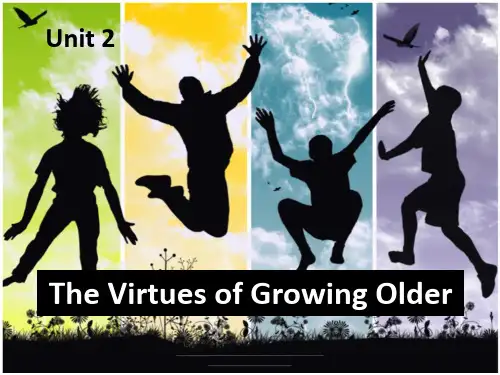

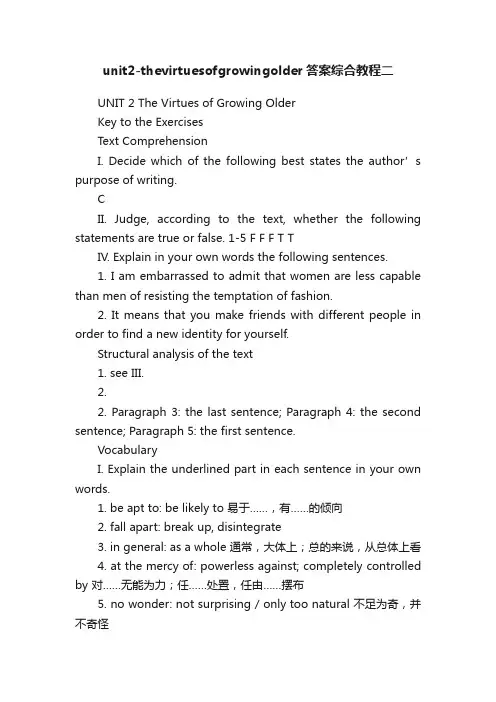
unit2-thevirtuesofgrowingolder答案综合教程二UNIT 2 The Virtues of Growing OlderKey to the ExercisesText ComprehensionI. Decide which of the following best states the author’s purpose of writing.CII. Judge, according to the text, whether the following statements are true or false. 1-5 F F F T TIV. Explain in your own words the following sentences.1. I am embarrassed to admit that women are less capable than men of resisting the temptation of fashion.2. It means that you make friends with different people in order to find a new identity for yourself.Structural analysis of the text1. see III.2.2. Paragraph 3: the last sentence; Paragraph 4: the second sentence; Paragraph 5: the first sentence.VocabularyI. Explain the underlined part in each sentence in your own words.1. be apt to: be likely to 易于……,有……的倾向2. fall apart: break up, disintegrate3. in general: as a whole 通常,大体上;总的来说,从总体上看4. at the mercy of: powerless against; completely controlled by 对……无能为力;任……处置,任由……摆布5. no wonder: not surprising / only too natural 不足为奇,并不奇怪II. Fill in the blank in each sentence with a word or phrase taken from the box in its appropriate form.1. delay2. Feverishly3. fa?ade4. confronted5. premise6. dreaded7. automatically8. awaitingIII. Fill in the blanks with the appropriate forms of the given words.1. obsessive2. moodiness3. tolerable4. beneficial5. satisfying6. hidden7. preference8. criticismsIV. Choose the word or phrase that can replace the underlined part in each sentence. 1-4 CDAA 5-8 BDCB V. Give a synonym or an antonym of the word underlined in each sentence in the sense it is used.1. Synonym: conceal, disguise2. Antonym: narrow3. Synonym: satisfaction, happiness, joy4. Synonym: merits, advantages5. Synonym: fat, plump6. Synonym: well-built7. Antonym: old-fashioned, outdated8. Synonym: clearly, evidentlyVI. Write in each space one word that has the same prefix as underlined in each given word.1. preface prepare 5. periphery perimeter2. prologue progress 6. dialogue diameter3. foresight foresee 7. semifinal semiconductor4. paralysis parallel 8. devaluate decelerateGrammarI. Complete the following sentences with the appropriate forms of the nouns given.1. agony2. agonies3. experience4. experiences5. youth6. a youth7. a great help8. a good knowledge9. a gray hair 10. workII. Complete the following sentences with quantifiers & determiners.1. A2. B3. D4. C5. A6. B7. B8. CIII. Complete the reading.a lot of, a little, some, a few, A, some, some, a lot of, x, many, x, a lot ofIV. Complete the following with every, each, everyone, every one, all.1. all, every one2. each3. every4. each5. everyone6. each7. everyone, everyone8. eachV. Correct errors in the following sentences.1. you must take care2. Though he received the document late at night; it3. When you fell4. When you read5. I became clear about what he meant6. We saw the first star shining in the sky7. who were eating8. he was cleaningTranslationI. Translate the following sentences into Chinese.1.许多中年人去健身房锻炼,到街上跑步,为的是延缓衰老。
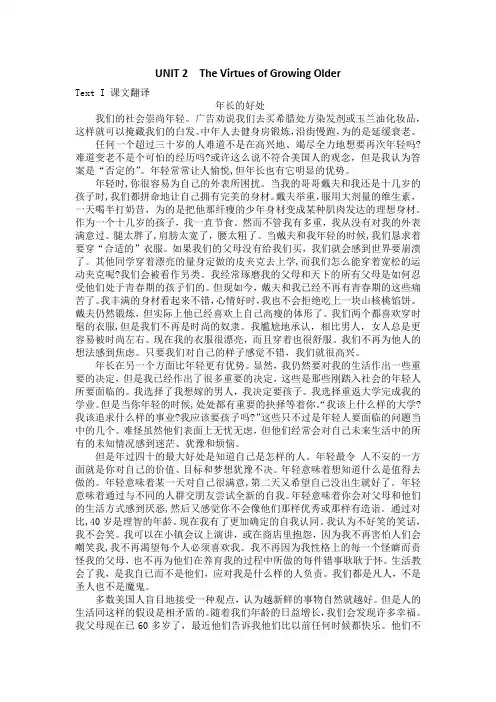
UNIT 2 The Virtues of Growing OlderText I 课文翻译年长的好处我们的社会崇尚年轻。
广告劝说我们去买希腊处方染发剂或玉兰油化妆品,这样就可以掩藏我们的白发。
中年人去健身房锻炼,沿街慢跑,为的是延缓衰老。
任何一个超过三十岁的人难道不是在高兴地、竭尽全力地想要再次年轻吗?难道变老不是个可怕的经历吗?或许这么说不符合美国人的观念,但是我认为答案是“否定的”。
年轻常常让人愉悦,但年长也有它明显的优势。
年轻时,你很容易为自己的外表所困扰。
当我的哥哥戴夫和我还是十几岁的孩子时,我们都拼命地让自己拥有完美的身材。
戴夫举重,服用大剂量的维生素,一天喝半打奶昔,为的是把他那纤瘦的少年身材变成某种肌肉发达的理想身材。
作为一个十几岁的孩子,我一直节食。
然而不管我有多重,我从没有对我的外表满意过。
腿太胖了,肩膀太宽了,腰太粗了。
当戴夫和我年轻的时候,我们恳求着要穿“合适的”衣服。
如果我们的父母没有给我们买,我们就会感到世界要崩溃了。
其他同学穿着漂亮的量身定做的皮夹克去上学,而我们怎么能穿着宽松的运动夹克呢?我们会被看作另类。
我经常琢磨我的父母和天下的所有父母是如何忍受他们处于青春期的孩子们的。
但现如今,戴夫和我已经不再有青春期的这些痛苦了。
我丰满的身材看起来不错,心情好时,我也不会拒绝吃上一块山核桃馅饼。
戴夫仍然锻炼,但实际上他已经喜欢上自己高瘦的体形了。
我们两个都喜欢穿时髦的衣服,但是我们不再是时尚的奴隶。
我尴尬地承认,相比男人,女人总是更容易被时尚左右。
现在我的衣服很漂亮,而且穿着也很舒服。
我们不再为他人的想法感到焦虑。
只要我们对自己的样子感觉不错,我们就很高兴。
年长在另一个方面比年轻更有优势。
显然,我仍然要对我的生活作出一些重要的决定,但是我已经作出了很多重要的决定,这些是那些刚踏入社会的年轻人所要面临的。
我选择了我想嫁的男人,我决定要孩子。
我选择重返大学完成我的学业。
但是当你年轻的时候,处处都有重要的抉择等着你。
UNIT 2 The Virtues of Growing OlderKey to the ExercisesText ComprehensionI. Decide which of the following best states the author’s purpose of writing.CII. Judge, according to the text, whether the following statements are true or false.1-5 F F F T TIV. Explain in your own words the following sentences.1. I am embarrassed to admit that women are less capable than men of resisting the temptation of fashion.2. It means that you make friends with different people in order to find a new identity for yourself.Structural analysis of the text1. see III.2.2. Paragraph 3: the last sentence; Paragraph 4: the second sentence; Paragraph 5: the first sentence.VocabularyI. Explain the underlined part in each sentence in your own words.1. be apt to: be likely to 易于……,有……的倾向2. fall apart: break up, disintegrate3. in general: as a whole 通常,大体上;总的来说,从总体上看4. at the mercy of: powerless against; completely controlled by 对……无能为力;任……处置,任由……摆布5. no wonder: not surprising / only too natural 不足为奇,并不奇怪II. Fill in the blank in each sentence with a word or phrase taken from the box in its appropriate form.1. delay2. Feverishly3. façade4. confronted5. premise6. dreaded7. automatically8. awaitingIII. Fill in the blanks with the appropriate forms of the given words.1. obsessive2. moodiness3. tolerable4. beneficial5. satisfying6. hidden7. preference8. criticismsIV. Choose the word or phrase that can replace the underlined part in each sentence.1-4 CDAA 5-8 BDCBV. Give a synonym or an antonym of the word underlined in each sentence in the sense itis used.1. Synonym: conceal, disguise2. Antonym: narrow3. Synonym: satisfaction, happiness, joy4. Synonym: merits, advantages5. Synonym: fat, plump6. Synonym: well-built7. Antonym: old-fashioned, outdated8. Synonym: clearly, evidentlyVI. Write in each space one word that has the same prefix as underlined in each given word.1. preface prepare 5. periphery perimeter2. prologue progress 6. dialogue diameter3. foresight foresee 7. semifinal semiconductor4. paralysis parallel 8. devaluate decelerateGrammarI. Complete the following sentences with the appropriate forms of the nouns given.1. agony2. agonies3. experience4. experiences5. youth6. a youth7. a great help8. a good knowledge9. a gray hair 10. workII. Complete the following sentences with quantifiers & determiners.1. A2. B3. D4. C5. A6. B7. B8. CIII. Complete the reading.a lot of, a little, some, a few, A, some, some, a lot of, x, many, x, a lot ofIV. Complete the following with every, each, everyone, every one, all.1. all, every one2. each3. every4. each5. everyone6. each7. everyone, everyone8. eachV. Correct errors in the following sentences.1. you must take care2. Though he received the document late at night; it3. When you fell4. When you read5. I became clear about what he meant6. We saw the first star shining in the sky7. who were eating8. he was cleaningTranslationI. Translate the following sentences into Chinese.1.许多中年人去健身房锻炼,到街上跑步,为的是延缓衰老。
The Virtues of Growing Older (长大变老有好处)Our society worships youth. Advertisements convince us to buy Grecian Formula and Oil of Olay so we can hide the gray in our hair and smooth the lines on our face. Television shows feature attractive young stars with firm bodies, perfect complexions, and thick manes of hair. Middle-aged folks work out in gyms and jog down the street, trying to delay the effects of age.我们所处的社会崇尚年轻。
连篇累牍的广告劝我们买希腊配方的洗发水和玉兰油,这样的话,白发无处可寻,面部的皱纹也能被抚平。
电视节目上尽是体魄强健,肤色无暇,头发浓密的年轻明星。
而中年人则在体育馆里锻炼,在马路上慢跑,尽量不让岁月过早地留下痕迹。
Wouldn't any person over thirty gladly sign with the devil just to be young again? Isn't aging an experience to be dreaded? Perhaps it is unAmerican to say so, but I believe the answer is "No." Being young is often pleasant, but being older has distinct advantages.不是所有三十出头的人都会为了重获青春而心甘情愿地与魔鬼订立合约吗?长大变老难道不可怕吗?说它不可怕可能不是美国人的回答,但我却认为长大变老不可怕。
U n i t T h e V i r t u e s o f G r o w i n g O l d e r答案综合教程二集团文件版本号:(M928-T898-M248-WU2669-I2896-DQ586-M1988)U N I T2T h e V i r t u e s o f G r o w i n g O l d e r Key to the ExercisesText ComprehensionI. Decide which of the following best states the author’s purpose of writing.CII. Judge, according to the text, whether the following statements are true or false.1-5 F F F T TIV. Explain in your own words the following sentences.1. I am embarrassed to admit that women are less capable than men of resisting the temptation of fashion.2. It means that you make friends with different people in order to find a new identity for yourself.Structural analysis of the text1.?see III.2.2.?Paragraph 3: the last sentence; Paragraph 4: the second sentence; Paragraph 5: the first sentence.VocabularyI. Explain the underlined part in each sentence in your own words.1. be apt to: be likely to 易于……,有……的倾向2. fall apart: break up, disintegrate3. in general: as a whole 通常,大体上;总的来说,从总体上看4. at the mercy of: powerless against; completely controlled by对……无能为力;任……处置,任由……摆布5. no wonder: not surprising / only too natural 不足为奇,并不奇怪II. Fill in the blank in each sentence with a word or phrase taken from the box in its appropriate form.1. delay2. Feverishly3. fa?ade4. confronted5. premise6. dreaded7. automatically8. awaitingIII. Fill in the blanks with the appropriate forms of the given words.1. obsessive2. moodiness3. tolerable4. beneficial5. satisfying6. hidden7. preference8. criticismsIV. Choose the word or phrase that can replace the underlined part in each sentence.1-4 CDAA 5-8 BDCBV. Give a synonym or an antonym of the word underlined in each sentence in the sense it is used.1. Synonym: conceal, disguise2. Antonym: narrow3. Synonym: satisfaction, happiness, joy4. Synonym: merits, advantages5. Synonym: fat, plump6. Synonym: well-built7. Antonym: old-fashioned, outdated8. Synonym: clearly, evidentlyVI. Write in each space one word that has the same prefix as underlined in each given word.1. preface prepare 5. periphery perimeter2. prologue progress 6. dialogue diameter3. foresight foresee 7. semifinalsemiconductor4. paralysis parallel 8. devaluatedecelerateGrammarI. Complete the following sentences with the appropriate forms ofthe nouns given.1. agony2. agonies3. experience4. experiences5. youth6. a youth7. a great help8. a good knowledge9. a gray hair 10. workII. Complete the following sentences with quantifiers & determiners. 1. A 2. B 3. D 4. C5. A6. B7. B8. CIII. Complete the reading.a lot of, a little, some, a few, A, some, some, a lot of, x, many, x, a lot ofIV. Complete the following with every, each, everyone, every one, all.1. all, every one2. each3. every4. each5. everyone6. each7. everyone, everyone8. eachV. Correct errors in the following sentences.1. you must take care2. Though he received the document late at night; it3. When you fell4. When you read5. I became clear about what he meant6. We saw the first star shining in the sky7. who were eating8. he was cleaningTranslationI. Translate the following sentences into Chinese.1.许多中年人去健身房锻炼,到街上跑步,为的是延缓衰老。
Unit 2 The Virtues of Growing OlderⅠ.Words and Expressions1. aging:n. the process of becoming olde.g. People want to figure out whether doing sports can influence aging in the body. Comparison: elderly: a. a polite word meaning olde.g. The building has now been converted into a retirement home for the elderly.senior citizen: a polite expression meaning old people2. dread: vt. feel great fear or anxiety aboute.g. The little girl dreads sleeping alone.The staff in this company dread to think what will happen if the financial crisis comes. Derivation: dreadful a.Synonym: fear, frighten3. distinct: a. noticeable, unmistakablee.g. The footprints are quite distinct; they must be fresh.Collocation: distinct from sth.: different in kind; separatee.g. Mozart’s style is quite distinct from Haydn’s.Astronomy, as distinct from astrology, is an exact science.天文学是一门严谨的科学,与占星术完全不同。
Derivation: distinction n. distinctly ad.4. be obsessed with: have an unreasonably strong and continuous interest in particular things or personse.g. The new president was obsessed with the thought of being watched.新主席总觉得受人监视而心神不宁。
Derivation: obsession n. obsessive a.Translation: 她童年时一直害怕父母离异。
The fear of her parents’ divorce obsessed her throughout her childho od. Synonym: preoccupy, haunt5. perfect: vt. make sth. perfecte.g. Nowadays, more and more foreigners come to China to perfect their Chinese. Derivation: perfection n. perfectible a.Comparison: improve vt. cause sth. to become betterrefine vt. improve sth. by removing defects and attending to details6. turn into: change completely and become sth. elsee.g. After years’ development, Shenzhen, which used to be a small village, has turned into an international metropolis.Synonym: change into, becomeComparison: turn against sb. 与某人反目成仇turn sth inside out把里面翻作外面turn (sb. / sth.) over(使某人/某物)翻身或翻转7. diet: vi. eat less in order to lose weighte.g. The doctor told the patient to diet and take some exercise.n. the type of food that a person regularly eatse.g. Exercise and a well-balanced diet keeps you fit and healthy.Collocation: a diet of sth.: so much of sth. that you feel boring or unpleasante.g. a constant diet of soap operas on TV 多得令人腻烦的电视连续剧8. be satisfied with: feel pleased because you have what you want or because things have happened in the way that you hopede.g. The CEO of this company is not satisfied with the volume of business.Comparison: satisfactory: a. a word for describing a result, situation, etc., that makes one feel satisfied because it is what one was hoping fore.g. The score of her TOFEL was satisfactory.satisfying a. a word for describing a job, activity, or experience that makes one satisfied because one enjoys doing it and results are often very goode.g. There’s something very satisfying about making explorations.Synonym: gratify, content9. plead: vi. make an urgent, emotional statement or request for sth.e.g. The little girl pleaded with her parents not to leave her in her uncle’s home.The criminal pleaded to see his wife once more.Comparison: beg vi. ask sb. very strongly in a way that makes one feel ashamed or makes other people lose respect for hime.g. The unfilial son begged mercy of his mother.Collocation: plead with sb. for sth. make repeated urgent requests to sb. for sth.10. tolerate: vt. be willing to accept sth. unpleasant or difficult, even though one does not like it or approve ite.g. As newcomers, they had to tolerate the awful weather and the tough living conditions. Comparison:stand: vt. accept or be forced to accept an unpleasant situationendure: vt. accept or be forced to accept an unpleasant situation for a long timebear: vt. accept or be forced to accept an unpleasant situation that makes one angry, sad, or upsetput up with: accept or be forced to accept an annoying situation or unpleasant behavior as part of one’s daily lifeDerivation: tolerant a. toleration n.11. beyond: prep. outside the range or limit ofe.g. Dealing with such a troublesome problem is beyond my capability.The radio is beyond repair. 这台收音机已经不能修理了。
Collocation: be beyond sb.: be impossible for sb. to imagine, understand or calculatee.g. It’s beyond me why she wants to marry Burton. 我不明白她为什么想嫁给伯顿。
Antonym: within12. agony: n. extreme mental or physical pain or sufferinge.g. The mother was in an agony of losing five sons in the war.He suffered agonies of remorse. 他饱受悔恨的煎熬。
Derivation: agonize v. agonizing a. agonizingly ad.Synonym: distress, anguish13. deny oneself: not do sth. that one enjoys doing or have sth. one desires to have, because he thinks that will be good for hime.g. He denied himself all small pleasures and luxuries in his effort to live a holy life. Comparison: do without: be able to manage without sth. one really wants to havee.g. No one can do without drinking water for a long time.Translation: 为了省钱给女儿治病,他戒烟了。